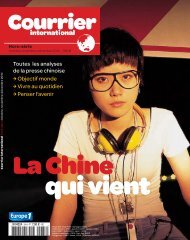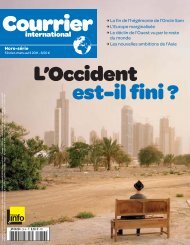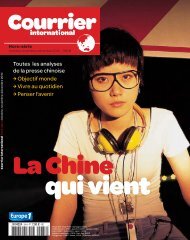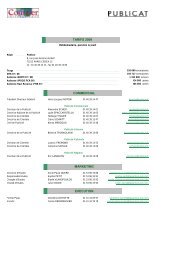2 ОРГАНИЗАЦИЯ И МЕТОДИКА РАБОТ - Courrier international
2 ОРГАНИЗАЦИЯ И МЕТОДИКА РАБОТ - Courrier international
2 ОРГАНИЗАЦИЯ И МЕТОДИКА РАБОТ - Courrier international
You also want an ePaper? Increase the reach of your titles
YUMPU automatically turns print PDFs into web optimized ePapers that Google loves.
8. DETERMINATION OF INNOVATIVE TECHNOLOGIES OF REMOVAL OF SPENT<br />
TECHNICAL LIQUIDS AND OILS, CONTAINING ESPECIALLY HAZARDOUS<br />
SUBSTANCES<br />
8.1. Analysis of technologies of removal of hazardous wastes and substantiation of the best<br />
development direction.<br />
Data presented in Appendix 1 show that the number of the state-of-the-art methods and<br />
technologies of elimination of hazardous organic waste amounts for hundreds of developments.<br />
In this context, having regard to the elimination of organic waste in the Arctic zone it is useful to<br />
systematize primary data for further substantiation of the most appropriate technology.<br />
This subsection is dedicated to this direction of research. It provides summary information<br />
presented in [52] concerning, primarily, the elimination of the most hazardous types of waste<br />
PCB both in the main technological equipment and the most hazardous substance itself.<br />
8.1.1. Analysis of PCB deactivation technologies in contaminated transformers an containers<br />
The technologies of decontamination (washing) of transformers and containers currently used are<br />
divided into two main groups.<br />
The first, the biggest group is the technologies of PCB washing with the further elimination of<br />
transformers and containers.<br />
The second, small group is the technologies of washing transformer inside from PCB with<br />
subsequent filling the alternative liquid (retrofill).<br />
Foreign industrial technology belonging to the first group are united by the common principles<br />
of their implementation. This modus operandi is to pre-wash transformer "in assembly", and then<br />
dismantle and additionally wash metal parts till PCB content on the surface reaches less than 50<br />
ppm (mg / kg). Metal parts with such a low residual PCB content belong to non-hazardous waste<br />
according European standards and can be disposed of by any acceptable way. The rest of the<br />
transformer, wooden and cardboard waste containing more than 50 ppm (mg / kg) of PCB are<br />
burned or disposed of in special landfills in compliance with the stringent requirements of<br />
environmental safety.<br />
Therefore, foreign industrial cleaning technologies of washing transformers and containers from<br />
PCB using a solvent are a multiple-stage process involving both expensive and relatively cheap<br />
equipment [53 - 55]. Performance of foreign plants to wash transformers and containers from<br />
PCB is from 2000 to 30000 tons per year. The cost of washing a ton of transformers and<br />
containers is from 800 to 1650 U.S. dollars.<br />
The examination of three Russian technologies of washing transformers and containers from<br />
PCB showed that they all belong to technology group 1:<br />
washing from PCB methylene chloride vapors, is recommended by JSC Petrokhim-Tekhnologia<br />
together with RSC Prikladnaya Khimia, after checking in a pilot scale [56,57];<br />
washing from PCB using toluene is presented by enterprise "GITOS" after pilot testing [58];<br />
washing from PCB using water wash liquid was recommended by Novolipetsk Metallurgical<br />
Complex after pilot testing [59].<br />
All Russian technologies provide for cleaning transformers from PCB "in-assembly" only with<br />
their subsequent disassembly and disposal of metal parts<br />
FINAL REPORT for Contract No. CS-NPA-Arctic-13/2009 of December 01, 2009 within the framework of pilot project Development<br />
of Technology of clean up of the area of Decommissioned Sites of The Russian Federation Ministry of Defense in the Arctic by the<br />
Example of Alexanra Island of Franz Josef Land Archipelago from Hazardous Waste<br />
145








